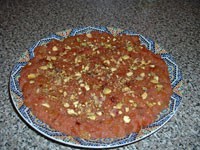Arab American Entrepreneur Helps Revive Ancient Holy Land Industry
Cremisan Wine Estate and monastery in Beit Jala, near Bethlehem in Palestine.BY: Nisreen Eadeh/Staff Writer
When Palestinian-American entrepreneur Jason Bajalia hears “Palestine,” he thinks “opportunity.” For the last four years, Jason has been involved in the revival of the ancient Palestinian winemaking industry to offer Americans a taste of the Holy Land. Through his family-owned business, Terra Sancta Trading, Jason is importing Palestinian-made wine, arak and beer to the U.S.
“I was in the restaurant business for 16 years, and in that time, we noticed there was a lot of interest in Lebanese wines and beer, like Almaza” Jason told Arab America. “But I really wanted to bring something from Palestine.”
So in 2012, Jason met with the Arak Ramallah distillers, who introduced him to one of the finest red wines Jason had ever sampled: Cremisan Baladi. Made from 100% indigenous baladi asmar Palestinian grapes, Cremisan Wine Estate wines are unlike any other brand in the world. Rather than making wine from European grape varietals, like Cremisan’s competitors in Israel and Lebanon, the Palestinian winery uses grapes native to their land, including baladi, dabouki, hamdani, and jandali.
Cremisan WineryItalian monks have been making the wine at a monastery in Beit Jala, close to Bethlehem, since 1885. But in 2007, Italian winemaker Riccardo Cotarella found himself at the monastery while on a holy pilgrimage.
“He loved the property and the whole story behind it, but he didn’t care for the wine,” Jason recalled. Cotarella wanted to sell the wine internationally, but not until the quality was improved. “So he facilitated the donation of winemaking equipment and trained Palestinians in how to make the wine. And now the wine is distributed in Europe and America; it’s an award winning wine.”
Almost ten years later, the Beit Jala monastery continues to make wine, but not without the help of Palestinian farmers and harvesters. The monastery’s vineyard is too small to keep up with growing demand, requiring them to buy grapes from local Palestinian farmers. Although the winery operates on Catholic owned property, it employs Christian and Muslim Palestinians year-round, as well as the annual harvest every August. As the winery grows, the number of people the winery employs grows, too. Profits from the winery help operate the school and orphanage run by Salesian nuns in Beit Jala.
A grape harvest in Mali’iya, a Palestinian village in the north near Lebanon, at a winery called Juliya, named after the family matriarch.Economic stagnation, high unemployment rates, and limited education opportunities have been burdening Palestinian society for decades, as a result of the Israeli occupation. However, Terra Sancta is overcoming the occupation’s barriers to place Palestinian products in the international market.
Israel’s occupation and checkpoints force Terra Sancta wine and arak to undergo a rigorous exporting process. “When the arak leaves the winery in Beit Jala, it’s technically in Israel because Jerusalem’s ‘suburban’ settlements have grown so much they nearly touch Bethlehem,” Jason explained. “So it’s immediately offloaded from the Palestinian truck to an Israeli truck and driven to the port in Haifa. And since it’s a Palestinian product, it has to be offloaded and scanned again before getting on a ship.”
Terra Sancta wine and arak must undergo inspection once again in the U.S., also because the products are Palestinian. Israeli wineries do not face the same costly hurdles in their exporting process.
“We have the physical barrier of having to pay more to get wine and arak out of Palestine,” Jason stated. “And there’s also the psychological barrier of labeling it a ‘West Bank’ product.”
In the U.S., businesses can’t put “product of Palestine” on a label. Terra Sancta’s labeling options were “Israel” or “West Bank”. Terra Sancta chose “West Bank”, which prompted concern from supporters of the Boycott, Divestment, and Sanctions (BDS) movement.
“The U.S. passed a law that said products from Israeli settlements must say ‘West Bank’ so not everyone realized this was a Palestinian product,” Jason clarified. “We had a lot of people asking if this was a settlement wine.”
Since there are very few Palestinian products being imported to the U.S. from the West Bank or Gaza, it was easy for the BDS movement to make the mistake. Terra Sancta petitioned to get a “Made in Palestine” label, which is still under review. Jason believes the only solution to the psychological barrier is for the U.S. to change its labeling policy.
Despite the obstacles, Terra Sancta imported 22,000 bottles of wine and arak to the U.S. in 2016. Customers include Middle Eastern restaurants, wine stores, and adventurous wine tasters from Brooklyn to San Francisco. Next year, Terra Sancta will be adding Shepherds Beer from Birzeit Brewery to its list of products, as well as wine made by Palestinians in Israel. Terra Sancta’s growth is a testament to the quality of the products, which not only improves Palestine’s economy, but the nation’s image, as well.
Cremisan Wine Estate’s winemaker Fadi Batarseh in the cellar.“The main benefit isn’t tangible or quantifiable,” Jason believes. “It’s the psychological aspect of it – people are surprised to learn that wine is made and consumed in Palestine, and that it’s good.” For Jason, Terra Sancta gives him an opportunity to engage with people and change hearts and minds about his homeland. “It’s surprising how many people don’t make the connection between Bethlehem and Christmas, but it’s something we try to focus on because Palestine is not just the place people see on the news.
Terra Sancta products make excellent gifts and libations during the holiday season! To inquire about purchasing wine and arak from Terra Sancta, visit the Terra Sancta Trading Facebook page. To learn more about Terra Sancta products, visit the website at TerraSanctaTrading.com.



